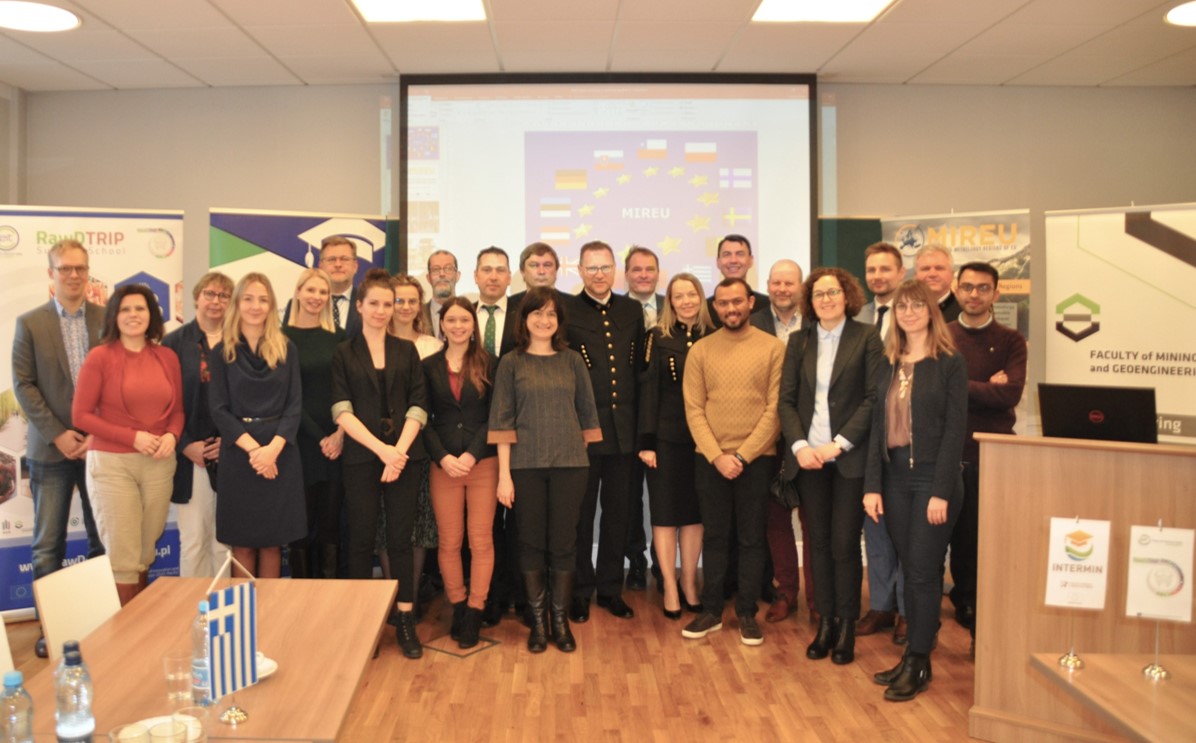
Workshop on skills and requirements in the mining and metallurgy regions
- Thu, 23/01/2020
On 5-6th December 2019, the international workshop on the subject of “Skills and requirements in the mining and metallurgy regions” was held as part of the MIREU project at the AGH University of Science and Technology in Krakow, Poland.
The aim of the workshop was to investigate which skills will be required by the mining and metallurgy industry in the future. The main goal of the meeting was not only related to the university curriculum offer or to discuss the present and future expectations of the mining and metallurgical industry, but to establish a detailed analysis of the influence of the industrial revolution 4.0 and the progressing automation and digitisation of production processes on past, present and future skills. Moreover, by taking into consideration future and present challenges, the strong influence of "soft" skills was analysed. The workshop’s discussions also discussed the set of skills of representatives of administrative and regulatory bodies who may influence the future course of mining and metallurgy activities.
The workshop participants included mining and metallurgy industry representatives, university speakers, MIREU and other international projects partners, as well as alumni and doctoral students from the EIT RawMaterials Alumni programme.
The Dean of the Faculty of Mining and Geoengineering, Professor Marek Cała, opened the workshop by welcoming all the guests to the workshop. In his speech, Dean Marek Cała emphasised the dynamic changes which are now taking place both in the mining and metallurgy industry, as well as in the higher education system. Moreover, Dean Marek Cała referred to the 100 years of tradition, history and development at the AGH-UST and the Faculty of Mining and Geoengineering. By doing this, the Dean emphasised the importance of the topic of the workshop on present and future challenges to the raw material industry. He also highlighted the necessity of constant adaptation of universities to the market changes and expectations.
The more detailed curriculum offered by the Mining and Geoengineering and the Non-Ferrous Metals Faculties, as well as models of cooperation with industry, were presented by Vice-Deans: Zbigniew Niedbalski and Beata Leszczyńska-Madej. Furthermore, Natalia Kowalska presented the aims and results of the RawD Trip Copper story summer school pilot program. Natalia Kowalska also included other initiatives under the KIC Raw Materials programme, in which students from around the Europe were involved.
Marco A Konrat Martins, a representative of the INTERMIN (International Network of Raw Materials Trainings Centers) international project presented the impact of mining and metallurgy industry developments in the short, medium and long-term on the employee competences. Moreover, Kontrat Martins included information on mapping of mining skills and knowledge in the EU. He pointed out that present and future challenges, like the constant digitisation of the mining and metallurgy industry, environmental influences, social acceptance, reaching for secondary deposits, as well as space and deep sea mining, require and will require tailor-suited knowledge and skills. Laurence Lamm from EIT RawMaterials presented the methodology for assessing gap areas in competences and skills. She emphasised the need to combine "hard" and "soft" skills in companies.
The second part of the workshop focused on the assessment of innovations, which have derived from the industrial revolution 4.0, as well as how the industrial revolution 4.0 has influenced skills and competences of employees in the mining and metallurgy industry. The impact of automation in the mining industry was presented by Waldemar Rączka (AGH-UST). Representatives of a mining company - Piotr Poks from KGHM Polska Miedź S.A. - and a metallurgical company - Gabriel Gilis from ArcelorMittal Poland - discussed how innovations affect the competences of employees and demonstrated training standards in their companies. Moreover, they identified challenges which their plants will have to face in the future.
The third part of the workshop was dedicated to the subject of skills, soft skills and competences of public administration bodies. Anna Ostręga and Zuzanna Łacny from AGH-UST presented the results of a research on the skills and education backgrounds of public administration representatives who participate in planning, licensing and issuing environmental and reclamation decisions. Joni Kivipelto, representative of the Finnish Ministry of Economy and Labor, described the assumptions and results of the Mine Specialisation Programme. This Finnish programme has been active since 2015 and has been addressed to representatives of the mining industry and administrative bodies. The programme was developed with the help of mining representative from the R&D sector. It has, for example, focused on improving the cooperation model between mining supervision representatives and decision-making bodies, as well as on the environmental safety of the mining operation activity. Joanna Pyrkosz-Pacyna, representative of the Faculty of Humanities at AGH-UST, replied in her presentation to the question "Soft skills - necessity or current trend?". She presented the results of her research, which was carried out at the request of one of the Polish City Councils. The subject of the study were requirements in relation to the "soft" skills which were imposed by business and industry. Moreover, Pyrkosz-Pacyna included information on "technical" and "non-technical" skills required by the Canadian mining companies.
The workshop ended with a panel discussion led by Laurence Lamm and Andrzej Biessikirski. Based on the discussions, recommendations on requirements for academia and aspects linked to skills in mining, metallurgical industry and in administration bodies, have been elaborated. The set of recommendations on the cooperation model between academia, vocational schools and industry will be included.
The workshop participants also took a part in the St. Barbara’s Day event. The mining fest took place on 6th December 2019. St. Barbara’s Day was a great opportunity to learn about Polish mining traditions and to make new contacts and network with representatives of the mining industry and R&D units.
Comments